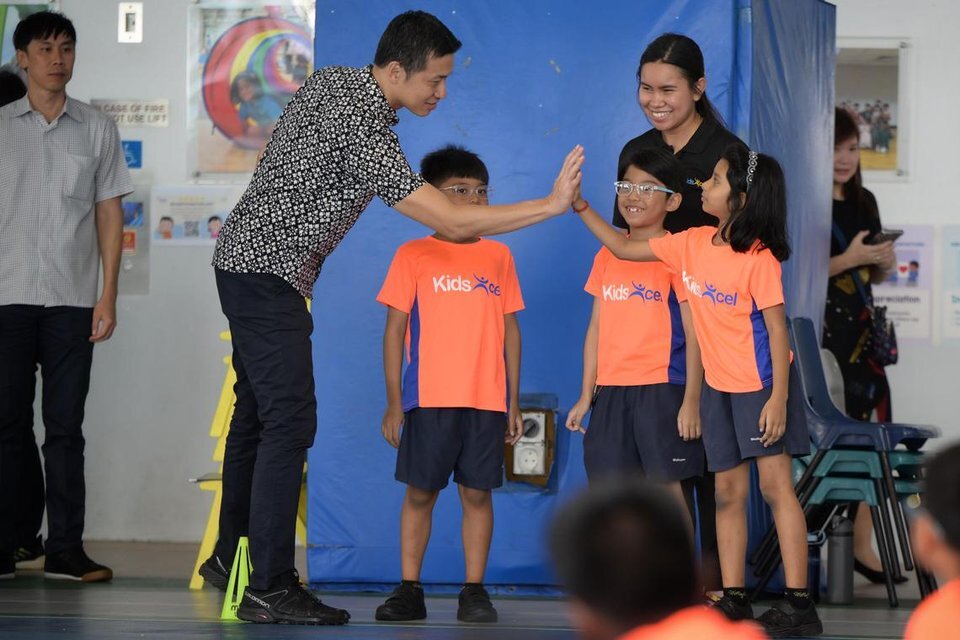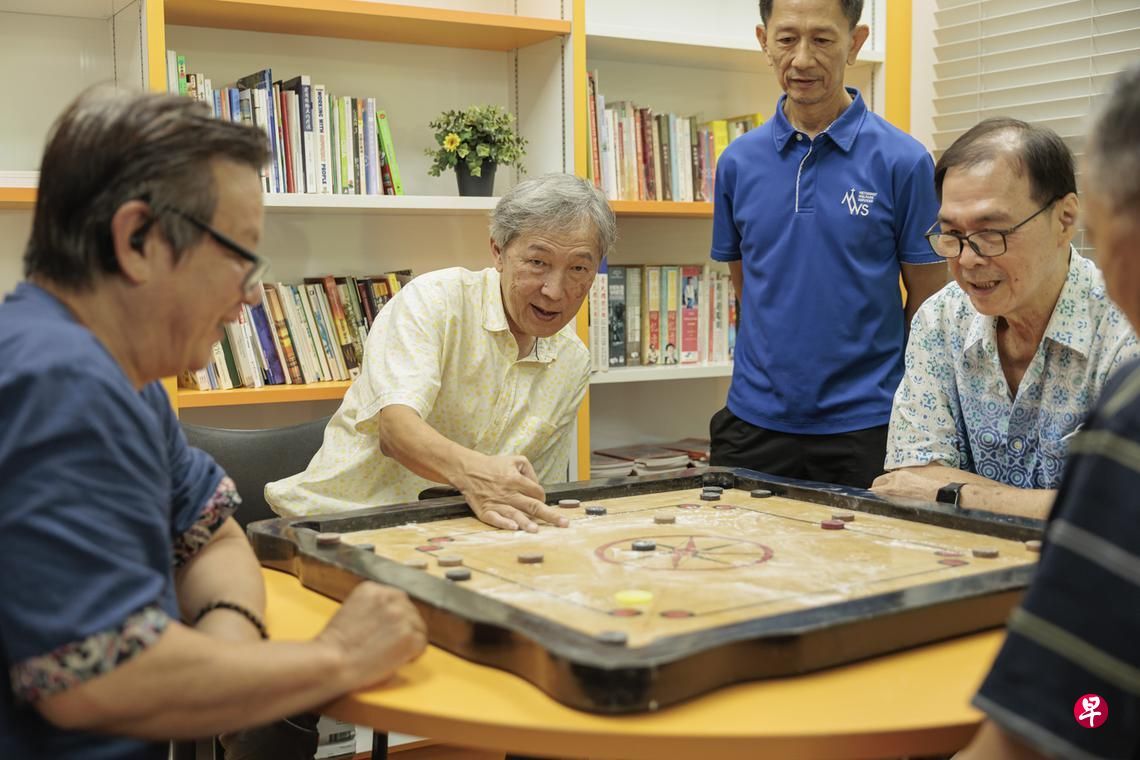CEO Catherine Loh goes on MONEY FM 89.3 to speak about the Sayang Sayang Fund with Michelle Martin


Michelle: Let’s start with CFS and the work that it does. How does it support charities and why did the Community Foundation of Singapore (CFS) start the Sayang Sayang Fund?
Catherine: The Community Foundation of Singapore is also a charity. We were founded in 2008, and our main objective is to inspire philanthropy in Singapore. We do that by helping donors achieve a greater impact with their giving in communities through charitable funds. Donors can establish their own funds or if they wish, they could support one of the Community Impact Funds that we’ve started up.
The Sayang Sayang Fund is one of such Community Impact Funds. It was set up in response to the needs that arose from the COVID 19 pandemic. With our understanding of the needs on the ground, our network of community partners, government agencies, and charity partners, we were able to quickly see what the needs out there were and who needed help.
We thought that by setting up this Fund, it would be an effective way of garnering financial support from those who want to give and disburse it quickly to those in need. That’s why we started it.
Michelle: I understand the Fund aims to help healthcare workers on the frontlines and the vulnerable, and that the Sayang Sayang Fund has pledged some quarter of a million dollars in taxi vouchers to frontline staff of healthcare institutions. How close is the Fund to meeting that goal?
Catherine: I’m happy to say that thanks to the generosity of our donors that we have actually disbursed over $400,000 of taxi and transport vouchers to 129 public hospitals, polyclinics and community healthcare providers. For that I have to thank ComfortDelGro, Grab and Gojek for partnering with us. And I must say that when we started the Fund, our first objective was the welfare of the healthcare workers on the frontline supporting us.
It is only right that we provide them with some love and care, sayang them a bit; that’s how we started this Fund. That was the first project we were looking to do. But over time, when we raised the money, we reached out to the charities through grants calls to send over their funding requests to us, we found that there were lots of needs. In the first round of grants calls we received almost three million dollars in requests for funding, and that is why we decided to continue with the Fund to raise more money.
Michelle: Where are the urgent needs now Catherine, and how is CFS helping to plug these gaps?
Catherine: With the circuit breaker measures, the loss of work and everybody having to stay at home, I would say that almost everyone in Singapore is affected. So one of the very urgent needs that we are trying to address is really how to support the students that have to study from home, or ‘home based learning’.
Through our Recess@Home programme, we are very grateful that we have the partnership support of the Ministry of Education to quickly reach out to thousands of children who might need financial support. Because these students do get subsidies or free food when they are in school, now these students cannot go to school. We want to provide them with some financial support so at least there is some assurance that they do get their proper meals while they study at home. So that is one need.
We realise too that there are seniors that may be sick and are living alone at home and not getting their usual medical care and support. We would also love to set up an emergency fund for those community nurses or even volunteers who are still allowed to do house visits to provide these vulnerable seniors with any form of support that they might need. We understand that there are lots of groups out there that are already providing food and basic necessities. Community nurses could supply them with medicines, medical support, essentials or anything they might need while they are staying at home on their own.
Even young students from families that might need them to take on a part-time job to supplement the family income are no longer able to do so. We could provide them with financial support so they can focus on their studies and not drop out of school because of the worries of not being able to provide for their family. That is one thing that we would like to do as well. Of course, we also have a lot of foreign guests and workers who are falling sick and how can we help them.
Last but not least, back to our healthcare workers again. With the number of cases that they have to take care of, I think it is very important that they stay physically and mentally healthy so that stress doesn’t get to them. We do wish to be able to continue to support these workers with transport vouchers or even funding so their organisations can charter, say buses to send them home quickly after their long work shift.
Michelle: Given the number and the sheer variety of needs out there, how is the Fund approaching giving? I understand in your initial phase, CFS was seeking donations of a million and above. Right now is pretty much any help welcome?
Catherine: We do have a target of three million, and as we speak there are more needs surfacing, so I do think the Fund will continue to stay open as long as there are needs out there that need support. We do have a team of grant-makers out there to assess the situation.
We don’t work alone; we work with our partners like government agencies, NCSS (National Council of Social Service) and AIC (Agency of Integrated Care). We have our whole network of charity partners and we have our other funders who are active and even volunteer groups. We work with all these groups to gather all this information to see where and how the Sayang Sayang Fund can help.
Michelle: Is there a minimum of a million dollars to be able to donate?
Catherine: No, any amount is welcome. I must say that Singaporeans in general have been very generous because last week when many of us received the $600 of the Solidarity payment, many people have donated online in support of Sayang Sayang and also the other charities that happen to be fund-raising.
Michelle: Singaporeans are so generous, so lovely to hear that. Can you share a little bit of your estimate of how much you’re going to need to meet the evolving emergency needs you anticipate for the next couple of weeks?
Catherine: I do hope we can raise another one to two million dollars so that we can actually provide longer term targeted support. I think this pandemic is not going to go away by early June. The economy will only be slowly cranking up after that, so there will still be people who need support one way or the other.
Listen to the full interview here: https://omny.fm/shows/money-fm-893/influence-lending-a-helping-hand-during-covid-19
Michelle: Let’s start with CFS and the work that it does. How does it support charities and why did the Community Foundation of Singapore (CFS) start the Sayang Sayang Fund?
Catherine: The Community Foundation of Singapore is also a charity. We were founded in 2008, and our main objective is to inspire philanthropy in Singapore. We do that by helping donors achieve a greater impact with their giving in communities through charitable funds. Donors can establish their own funds or if they wish, they could support one of the Community Impact Funds that we’ve started up.
The Sayang Sayang Fund is one of such Community Impact Funds. It was set up in response to the needs that arose from the COVID 19 pandemic. With our understanding of the needs on the ground, our network of community partners, government agencies, and charity partners, we were able to quickly see what the needs out there were and who needed help.
We thought that by setting up this Fund, it would be an effective way of garnering financial support from those who want to give and disburse it quickly to those in need. That’s why we started it.
Michelle: I understand the Fund aims to help healthcare workers on the frontlines and the vulnerable, and that the Sayang Sayang Fund has pledged some quarter of a million dollars in taxi vouchers to frontline staff of healthcare institutions. How close is the Fund to meeting that goal?
Catherine: I’m happy to say that thanks to the generosity of our donors that we have actually disbursed over $400,000 of taxi and transport vouchers to 129 public hospitals, polyclinics and community healthcare providers. For that I have to thank ComfortDelGro, Grab and Gojek for partnering with us. And I must say that when we started the Fund, our first objective was the welfare of the healthcare workers on the frontline supporting us.
It is only right that we provide them with some love and care, sayang them a bit; that’s how we started this Fund. That was the first project we were looking to do. But over time, when we raised the money, we reached out to the charities through grants calls to send over their funding requests to us, we found that there were lots of needs. In the first round of grants calls we received almost three million dollars in requests for funding, and that is why we decided to continue with the Fund to raise more money.
Michelle: Where are the urgent needs now Catherine, and how is CFS helping to plug these gaps?
Catherine: With the circuit breaker measures, the loss of work and everybody having to stay at home, I would say that almost everyone in Singapore is affected. So one of the very urgent needs that we are trying to address is really how to support the students that have to study from home, or ‘home based learning’.
Through our Recess@Home programme, we are very grateful that we have the partnership support of the Ministry of Education to quickly reach out to thousands of children who might need financial support. Because these students do get subsidies or free food when they are in school, now these students cannot go to school. We want to provide them with some financial support so at least there is some assurance that they do get their proper meals while they study at home. So that is one need.
We realise too that there are seniors that may be sick and are living alone at home and not getting their usual medical care and support. We would also love to set up an emergency fund for those community nurses or even volunteers who are still allowed to do house visits to provide these vulnerable seniors with any form of support that they might need. We understand that there are lots of groups out there that are already providing food and basic necessities. Community nurses could supply them with medicines, medical support, essentials or anything they might need while they are staying at home on their own.
Even young students from families that might need them to take on a part-time job to supplement the family income are no longer able to do so. We could provide them with financial support so they can focus on their studies and not drop out of school because of the worries of not being able to provide for their family. That is one thing that we would like to do as well. Of course, we also have a lot of foreign guests and workers who are falling sick and how can we help them.
Last but not least, back to our healthcare workers again. With the number of cases that they have to take care of, I think it is very important that they stay physically and mentally healthy so that stress doesn’t get to them. We do wish to be able to continue to support these workers with transport vouchers or even funding so their organisations can charter, say buses to send them home quickly after their long work shift.
Michelle: Given the number and the sheer variety of needs out there, how is the Fund approaching giving? I understand in your initial phase, CFS was seeking donations of a million and above. Right now is pretty much any help welcome?
Catherine: We do have a target of three million, and as we speak there are more needs surfacing, so I do think the Fund will continue to stay open as long as there are needs out there that need support. We do have a team of grant-makers out there to assess the situation.
We don’t work alone; we work with our partners like government agencies, NCSS (National Council of Social Service) and AIC (Agency of Integrated Care). We have our whole network of charity partners and we have our other funders who are active and even volunteer groups. We work with all these groups to gather all this information to see where and how the Sayang Sayang Fund can help.
Michelle: Is there a minimum of a million dollars to be able to donate?
Catherine: No, any amount is welcome. I must say that Singaporeans in general have been very generous because last week when many of us received the $600 of the Solidarity payment, many people have donated online in support of Sayang Sayang and also the other charities that happen to be fund-raising.
Michelle: Singaporeans are so generous, so lovely to hear that. Can you share a little bit of your estimate of how much you’re going to need to meet the evolving emergency needs you anticipate for the next couple of weeks?
Catherine: I do hope we can raise another one to two million dollars so that we can actually provide longer term targeted support. I think this pandemic is not going to go away by early June. The economy will only be slowly cranking up after that, so there will still be people who need support one way or the other.
Listen to the full interview here: https://omny.fm/shows/money-fm-893/influence-lending-a-helping-hand-during-covid-19
- Related Topics For You: ACCESSING QUALITY EDUCATION, AGEING WELL, AUDIO, CAREGIVER SUPPORT, CHARITY STORIES, CHILDREN, COMMUNITY IMPACT FUND, DIRECT AID, DONOR STORIES, FAMILIES, INCLUSIVITY & INTEGRATION, NEWS, SAYANG SAYANG FUND, SENIORS, YOUTH
.jpg)


